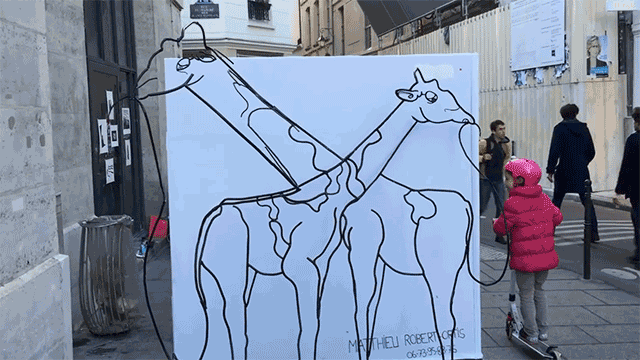Lady Mallowan was one of the most precise writers of all time. She had to be. As a mystery writer, her books depended upon attention to detail. For Lady Mallowan, a plot hole could literally ruin a story with a single logical inconsistency.
Did the whole plot present itself to her as one complete story in her head? No. But Lady Mallowan certainly relished that first spark of an idea.
“Plots come to me at such odd moments: when I am walking along a street, or examining a hat shop with particular interest, suddenly a splendid idea comes into my head, and I think, 'Now that would be a neat way of covering up the crime so that nobody would see the point.'” (Emphases mine, in case it wasn’t clear.)
Lady Mallowan quickly found out that those initial ideas change when translating them from ephemeral imagination to concrete words.
We’ve all had this feeling. Our initial idea looks so perfect in our minds. But as soon as we try to write it down, POOF!, it dissipates like trying to grab fog.
We’ll try to explore the why of those in a moment. But first, it’s important to underline that Lady Mallowan – better known as the Queen of Mystery, Agatha Christie – didn’t feel disconcerted by her vision changing as she wrote. In fact, she embraced it:
"Nothing turns out quite in the way that you thought it would when you are sketching out notes for the first chapter, or walking about muttering to yourself and seeing a story unroll."
She knew that the spark of an idea was just that: a spark. There was still work to do to get the flame.
The “Splendid Idea” Paradox and Its Crippling Effects
The Splendid Idea Paradox* describes a common affliction among writers. We feel it’s our quest to get that idea down on paper exactly as it is in our heads. Anything less is utter and abject failure. But here’s what they don’t tell you – that perfect vision you have for your story doesn’t exist. We’ve been set up for failure!
There are actually two things at work:
The phenomenon of the story not quite being the same on the page as it was in your head
Our reaction to those differences
We feel somehow less-than, like we aren’t “good enough” to capture that idea in its pure, perfect form.
Here’s how blogger Meg Dowell explains why this happens:
“An idea sounds better in your head than it does when you start writing it because up until now, you were looking at it at surface level. You saw all the fun and cool parts that made you excited about writing it. But now you’ve started dissecting it and really thinking about how to make it into a story that works at all angles…”
And that’s the key. In your mind, you’re looking at it straight on. But when you start fleshing it out and explore different angles, it by necessity has to change. You start writing about two giraffes, and you end up with an elephant...
I suspect there is something either psychological or neurological at work here – something in the way our brain processes information. Take dreams, for example. Do you ever have those dreams that make perfect sense when you’re dreaming them, but then you wake up and you think, “What the hell...?” It makes no sense at all. Given that imagination and dreams are closely linked, I wonder if a similar thing is happening. It makes sense in our imagination, but the logic breaks down when we bring it into the real world.
Whatever is at work, one thing is clear: The Splendid Idea in your head cannot be captured as it is and still make sense out here in the real world. For whatever reason, the spark never looks like the flame. And that’s okay. Agatha Christie would say the flame is better than the spark because all those logic holes have been filled in.
How to Overcome the Effects of the Splendid Idea Paradox
But I have some good news! There are some strategies for helping you feel not as bad when you do get caught up in the Splendid Idea Paradox.
Try to Capture the Feeling, Not the “Precise” Vision
You can never write down the “precise” vision – it’s a trick of mirrors. But what I’ve learned over the years is that you can capture the feeling of the moment locked in your head. If it’s the joy and breathlessness of flying your first kite, write a bright, joyful, breathless story. If it’s a dark story of murder and fear and dread, get your gothic horror on.
I think that really, the feeling is what’s most important about that scene in your head anyway. How it made you feel, and how you want your readers to feel. So when the “story” changes for me, it’s not quite as disconcerting if I can reflect the mood and tone it made me feel.
Look at It as Your First Edits
This approach flies in the face of everything I’ve written in these pages so far. But hey, we are talking about paradoxes here. So stay with me a moment…
Invariably, the draft you send to everyone to read – the draft you think is perfect – will have problems. Spelling, plot holes, inconsistencies... you name it. Problems you’re blind to until someone points them out. This is totally natural as well. It’s another layer of consciousness you need to get through, which is why editors and beta readers are so important to the novel-writing process, for example.
I experience this every day in my day job. I’ll send a client what I think is a perfect, whiz-bang piece, and inevitably I get back changes and even (GASP!) the occasional typo pointed out. I can tell you from experience that when you expect that there will be changes, even when you see it as perfect in that moment you hit “Send”, it gets much easier to accept those changes. I don’t even think about it anymore.
So to knit these ideas together: just as you know there will be edits down the line, look at that first draft as an “edit” of that perfect idea you had in your head. Because you know what? That first idea isn’t perfect, and the fact you think so – the fact that all of us writers think so – is an illusion.
Take a Leap of Faith
If you can’t wrap your head around anything I’ve written above, that’s okay. Take the leap of faith with me anyway. Keep writing (that’s the most important part), even if you are still irked that you’re not getting the story down “just right”. I promise you, eventually you won’t even think about it. You may even embrace it as Agatha Christie did!
Key Takeaways: The Splendid Idea Paradox describes the common feeling of frustration that the story we write down is not the same as the one in our heads. Worse, it can feel like failure and stop us from writing. Remember, the spark never looks like the flame. Instead, capture the essence of that spark and have faith that your story can actually burn brighter than you envisioned.
Over to You – How Does The Splendid Idea Paradox Affect You?
Have you experienced The Splendid Idea Paradox? How do you overcome it? Do you have any other ideas about why it happens? Let us know in the comments below!
I’ll leave you with a video of Doug Henning and his “profusion of illusions” below.
Until next time, keep writing with wild abandon!
~Graham
*If you Google “The Splendid Idea Paradox” with quotation marks, you won’t get anything except maybe this newsletter post. That’s ‘cuz I made it up. But I think it works.
This story idea came from a Reddit conversation: https://www.reddit.com/r/writing/comments/z99q1p/why_does_my_ideas_sound_horrible_when_i_write_it/
email me if you get lost.










I really loved this one, Graham! The concept of spark vs. flame is a great analogy to remind us of and I am in full support of your splendid idea paradox! I also agree that the dream and images examples were really beneficial in bringing this idea to light!
Well described Graham--I run into this issue all the time, and your examples (the dream, especially) and photos really help to make the point.